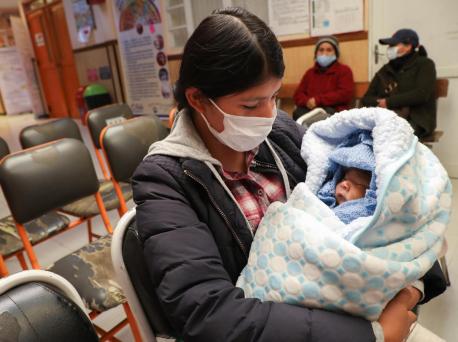
Getting Vaccines Where They Need to Be to Keep Children Safe
Vaccines are the world's safest method of protecting children from life-threatening diseases. That's why UNICEF works with partners in more than 100 countries to supply vaccines that reach 45 percent of the world's children under 5.
Teaming up with governments, the private sector, NGOs and other United Nations organizations, UNICEF ensures children receive the immunizations they need to stay healthy. In the video below, UNICEF Bolivia's Eduardo Rivero shows how UNICEF maintains the cold chain system that keeps vaccines at just the right temperature as they are transported via airplane, refrigerated truck and on foot to their destination, keeping millions of children in Bolivia safe from illness every year:
UNICEF "has been one of the most important partners," says cold chain technician Enrique Borda. "It has provided refrigerators, it has even provided vaccines so that now we can have a population that is not sick." Supporting Bolivia's national vaccination program means not only keeping vaccines safe at every step along the way, but also sending vaccination brigades out into the community and making sure that even those growing up in the remotest parts of the country are reached with lifesaving immunizations.
As a key partner of the COVAX Facility, UNICEF is also working to deliver 2 billion COVID-19 vaccine doses to countries around the world, including 1.2 billion doses to low- and middle-income countries, by the end of 2021. On March 21, Bolivia received its first shipment of 228,000 vaccine doses through COVAX.
The arrival of the vaccines, along with those supplied by the Bolivian government, "will contribute to fulfilling the rights of children and adolescents," says Rafael Ramirez, UNICEF Representative in Bolivia. "Although they are not the main [group] affected by the disease, they have been harmed by the interruption of face-to-face classes in their schools; their access to health services has been limited: their parents, grandparents and caregivers can fall ill and even lose their lives. Without a doubt, Bolivian children and adolescents are the main beneficiaries."
Vaccines save lives. Help UNICEF reach children around the world with the immunizations and health care they need. Please donate.
Top photo: In the city of El Alto, Bolivia, Julia Condori cradles her son, Aaron, as they wait their turn in the UNICEF-supported Mercedes Health Center for the child’s latest round of vaccinations. © UNICEF/UN0361728/Calderón. Video: Tong Su
HOW TO HELP
There are many ways to make a difference
War, famine, poverty, natural disasters — threats to the world's children keep coming. But UNICEF won't stop working to keep children healthy and safe.
UNICEF works in over 190 countries and territories — more places than any other children's organization. UNICEF has the world's largest humanitarian warehouse and, when disaster strikes, can get supplies almost anywhere within 72 hours. Constantly innovating, always advocating for a better world for children, UNICEF works to ensure that every child can grow up healthy, educated, protected and respected.
Would you like to help give all children the opportunity to reach their full potential? There are many ways to get involved.





